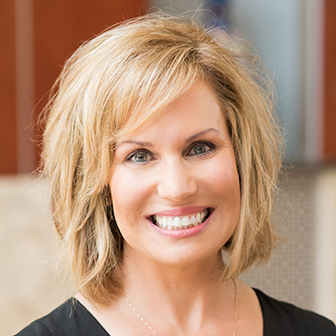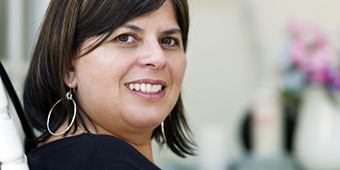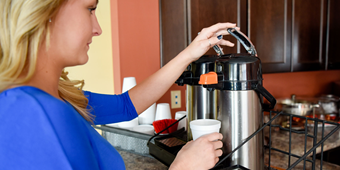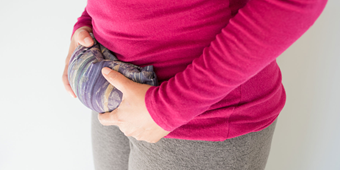Accepting and Loving (Maybe) Your Menopause Body
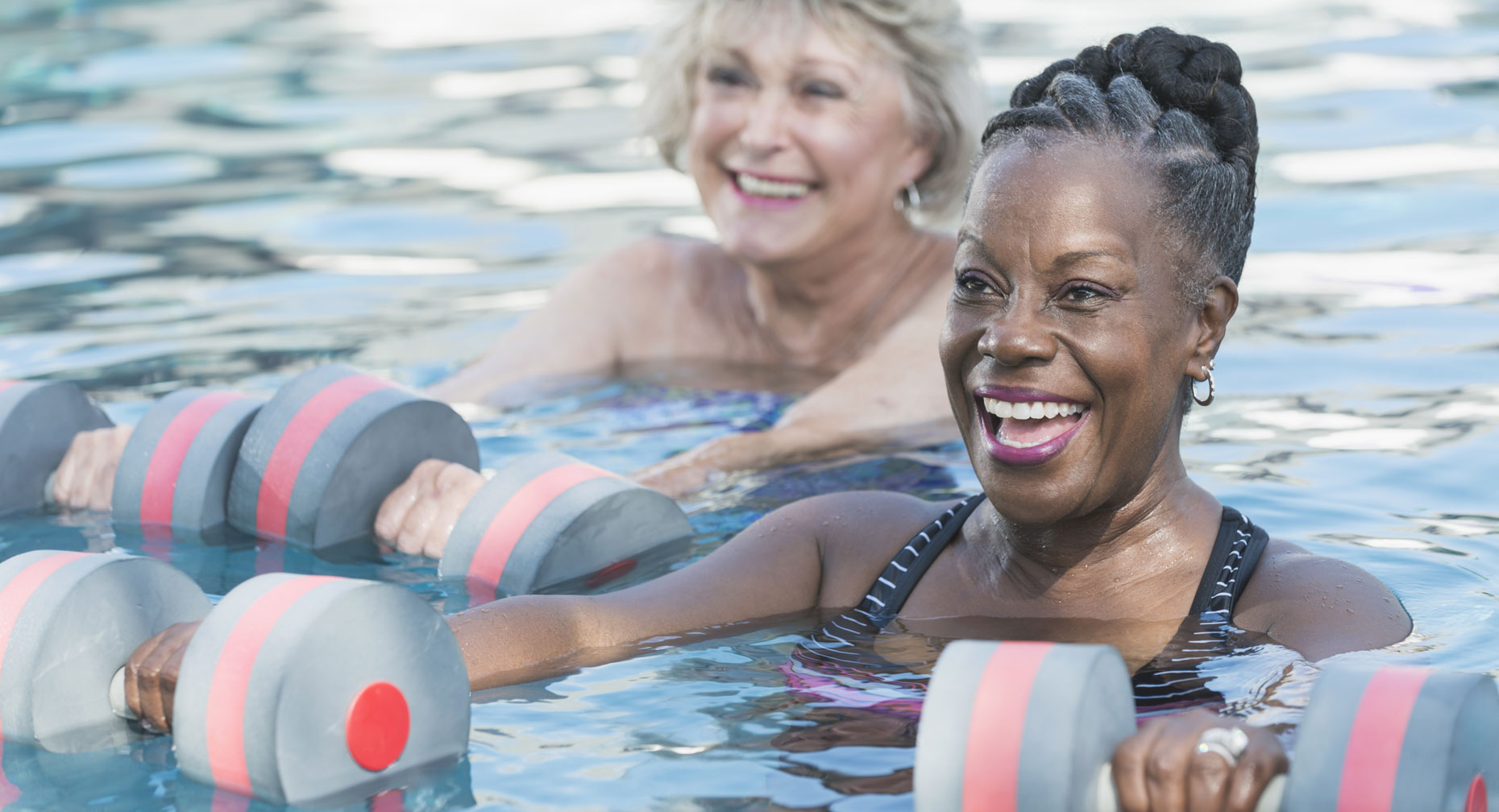
Find Your Perfect Match
Answer a few questions and we'll provide you with a list of primary care providers that best fit your needs.
“Anything you think is wrong with your body at the age of 35 you will be nostalgic for at the age of 45,” wrote the late Nora Ephron in her book, I Feel Bad About My Neck: And Other Thoughts on Being a Woman.
That’s right. Remember that tiny little bit of cellulite on your thigh that made you worry about wearing a swim suit 20, 30 years ago? Ha ha ha ha ha…
Silly young thing. These days, you just might avoid the beach altogether. Or, you pass a department store mirror and wonder — who is that? OH MY GOD IS THAT ME?
We may never reclaim our 20-something bodies, but we can stake a claim on emotional and physical well-being. We just need to understand and accept where we are in life, say the experts at Premier Health, and learn how to appreciate and care for the bodies that life has now bestowed upon us.
Why Is My Body Shape-Shifting?
Around menopause, waists thicken, hair thins and grays, and skin sags and wrinkles. Single wiry hairs sprout in places we don’t expect, and our joints get a bit stiff and achy. We don’t sleep well, which is ironic given how easily we seem to tire out.
Most of these changes are blamed on menopause, but some are due to other factors, like aging, heredity and how well you took care of your body in your youth (like all that time you spent working on a tan).
Weight gain, in particular, seems to be affected by aging and lifestyle as much as menopause. According to the North American Menopause Society (NAMS), the older we get, the less active many of us become, whether due to a busy life, health issues, or simply sloth. All the while, lean muscle mass decreases, and fat is more likely to accumulate.
Metabolism also plays a role, says Paul Jennewine, MD, of Middletown Medical Group. “The body metabolism rates start to slow typically in the 20s, but picks up pace in slowing in the 30s and each decade thereafter,” he explains. “Women especially see a progression in their loss of metabolic rates as they hit menopause.”
Dr. Jennewine talks about aging and metabolism.
Click play to watch the video or read video transcript.
J. Scott Bembry, MD, of Premier Ob-Gyn, reminds us that there are also medical conditions that can cause unwanted body changes, like thyroid disease. He recommends visiting your doctor for regular exams and to discuss any concerns about your changing body, just in case there’s a medical problem that needs to be addressed.
How Do I Get My Old Body Back?
You can’t.
“Unfortunately, there is no fountain of youth. I wish there were,” says Dr. Bembry, wistfully noting that men also have issues with their own aging bodies.
He cautions against getting caught up in claims on TV and the internet for “miracle” supplements, bioidentical hormones and beauty products. “You are not going to be magically transformed,” he warns.
We may never reclaim our 20-something bodies, but we can stake a claim on emotional and physical well-being.
However, Dr. Bembry and other experts say that there are two sure-fire things you can do to bring about positive change with your body: eat right and exercise.
This may not give you the body of a 25-year-old, but it goes a long way towards extending life by increasing muscle mass and burning fat. In turn, it lessens the risk of heart disease and diabetes, two health problems that increase as women age.
Exercise and a healthy diet also have important psychological benefits. Studies have shown they can decrease depression, improve sleep and make us feel better about what our bodies can still do.
I’m Embarrassed by My Looks
In a culture that seems to value fertile youth, aging can make us feel unattractive and worthless. We beat ourselves up over our changing faces and unrecognizable bodies.
Counselor Joy Witwer, LISW-S, of Samaritan Behavioral Health, calls this “stinkin’ thinkin’” – negative thoughts that become self-fulfilling prophecies. “We think it, therefore we manifest it,” she says.
For example, if we feel bad about our looks, we comfort ourselves with junk food, or numb our minds with TV. This compounds weight problems, and we end up feeling “like crap” and beating ourselves up for our choices. Which then leads to more eating, and more slacking, and, well…you get the picture.
“One-third of our life is post-menopausal,” says Witwer. “Accept that this is your new normal now,” and make the best of what you’ve got. She and NAMS recommend that you:
- Eat healthy and get fit in order to feel better about your body.
- Shift into positive thinking mode (a therapist can help). Positive people radiate energy and are perceived as more attractive.
- Develop new interests or resurrect past hobbies.
- Seek out new friends or reconnect with old ones.
In particular, it’s important to have a good support network of women of your own age who “get it.” Sandy Nickley, senior manager of Premier Health’s Expressions of Hope Boutique, works with women who experience hair loss during menopause. She emphasizes the value of reaching out to others when you’re feeling down about your looks.
“Connecting with other women is a great way to support each other,” Nickley says.
Sex and Your Changing Body
Most of us still long for and need physical closeness up to the end of our lives, but the challenges of aging and menopause take a toll on our sexuality.
This can lead us to question our attractiveness. Some of us may insist on keeping the lights out when having sex or changing in front of our partner. In addition, our energy levels might be low, our joints may be stiff or achy, and other changes, like vaginal dryness, can make intercourse difficult.
Witwer encourages you to have a frank talk with your partner, however awkward it may be. There’s a good chance that he or she, too, is struggling with aging and body image issues, and will welcome the chance to listen and share, she says.
Here are some suggestions from Witwer and NAMS for having “the talk” and reigniting the flame:
- Engage a therapist if you think that would be helpful.
- Choose a time when you’re relaxed and doing something active, like walking.
- Consider having the talk in the car if you think eye contact might be awkward.
- Speak in a non-threatening manner: “You know, I’m feeling lousy. I’d like to be able to talk to you about it. I just need you to listen and not go into problem-solving mode."
- Together, come up with creative ways that you can still appreciate each other physically, and still enjoy physical closeness.
- Remember your positive attributes — your smile, your voice, your sense of humor. Those probably haven’t changed!
- See your doctor to seek treatment for problems like vaginal dryness.
- Get out and become engaged: energy and enthusiasm for life can be aphrodisiacs.
Moving Forward
Ultimately, positive change and acceptance lies within you and you only. As Ephron also wrote, “Be the heroine of your life, not the victim.” Create change that makes you feel good about yourself, and support and encourage others, like your spouse, to do the same.
Find Your Perfect Match
Answer a few questions and we'll provide you with a list of primary care providers that best fit your needs.
Source: North American Menopause Society; Healthywomen.org; Healthtalk.org; J. Scott Bembry, MD, Premier Ob-Gyn; Joy Witwer, LISW-S, Samaritan Behavioral Health; Sandy Nickley, Premier Expressions of Hope Boutique





